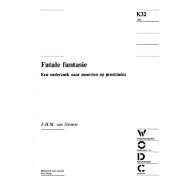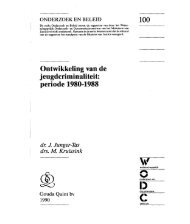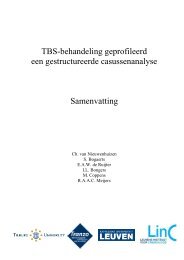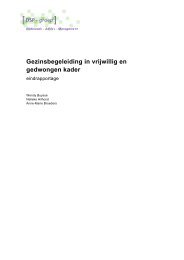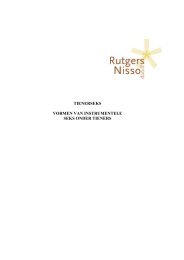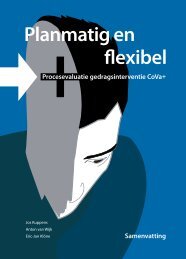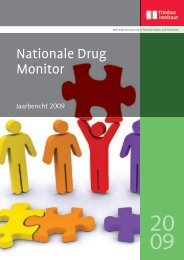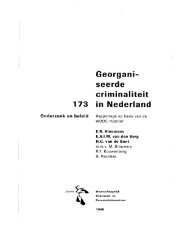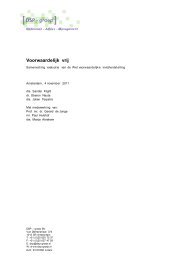Wet Koop onroerende zaken; de evaluatie - WODC
Wet Koop onroerende zaken; de evaluatie - WODC
Wet Koop onroerende zaken; de evaluatie - WODC
You also want an ePaper? Increase the reach of your titles
YUMPU automatically turns print PDFs into web optimized ePapers that Google loves.
MOLENGRAAFF INSTITUTE FOR PRIVATE LAW<br />
means that the parties have a better insight into all of the relevant aspects of a sale, especially if mo<strong>de</strong>l<br />
contracts are used as they specifically contain all the relevant clauses. On the other hand, it means that the<br />
parties can withdraw from oral agreements as long as these have not been laid down in writing.<br />
The written form requirement has proved to be effective. However, several questions have arisen in its<br />
application:<br />
- What is the status of oral agreements if the agreement is not laid down in writing?<br />
- What are the consequences of changes or additions to the contract after it was laid down in writing?<br />
- How can the quality of the written agreement be safeguar<strong>de</strong>d?<br />
- Should electronic contracting be possible?<br />
- How should the scope of application be <strong>de</strong>termined, with a view to the unclear terminology in article<br />
7:2 of the Civil Co<strong>de</strong>?<br />
- How should the inconsistencies in the terminology be <strong>de</strong>alt with?<br />
2.2 The status of oral agreements<br />
With regard to the status of oral agreements, the nullity of the contract has attracted the most support,<br />
which can be found in the parliamentary history, the literature, and most recent in the highest case law.<br />
The strict approach: that is no contract based on oral agreements and no possibility to oblige the other<br />
party to cooperate in laying down the agreement in a written form, mainly serves the purpose of legal certainty.<br />
A disadvantage of this approach is that parties can withdraw from oral agreements.<br />
According to the non-strict approach, it should be possible to hold parties to oral agreements by means of<br />
obliging the seller to cooperate in the establishment of the written agreement. A disadvantage of this approach<br />
is that it leaves uncertainty as to the moment when the agreement is reached, as well as the contents<br />
thereof. The legal basis for obliging the seller to cooperate would be the doctrine of pre-contractual<br />
liability. However, this doctrine does not lend itself to establishing legally binding agreements in this context.<br />
If it is thought <strong>de</strong>sirable to be able to hold the seller to oral agreements, it should be laid down in the law<br />
that if the agreement is not laid down in a written form, the sanction is that the buyer can annul the (oral)<br />
agreement. It should be noted that this solution is not favoured by the research team.<br />
If oral agreements do not lead to legally binding contracts, the doctrine of pre-contractual liability can be<br />
applied if the parties act in contradiction with fairness and reasonableness before the contract is laid down<br />
in a written form. The application of this norm as formulated in the case law can lead to damages being<br />
awar<strong>de</strong>d, or if necessary, to the obligation to continue negotiations. If there is proof of an oral agreement,<br />
this can be a factor to be taken into consi<strong>de</strong>ration when <strong>de</strong>ciding the case. Consi<strong>de</strong>ring the strict and restrained<br />
application of this, it does not seem to allow claims obliging a party to cooperate in the written<br />
agreement. This might be different un<strong>de</strong>r extraordinary circumstances such as a <strong>de</strong>liberate misrepresentation<br />
or an abuse of circumstances, but even in these circumstances the solution can be sought in awarding<br />
damages.<br />
2.3 Alterations, additions and the quality of the written agreement<br />
Laying down minimum requirements in the law concerning the content of the written agreement can<br />
contribute to solving problems with regard to the status of additional agreements and alterations to the<br />
original contract. Additionally, it contributes to safeguarding the quality of the written agreement. The<br />
consequences of additions and alterations to the original contract are not always obvious. This also raises<br />
the question whether the additions and alterations should be agreed upon in written form and if this<br />
triggers the renewal of the cooling-off period. Additions and changes that concern the minimum<br />
requirements affect the core of the agreement and therefore the validity of the original contract. Such<br />
243



